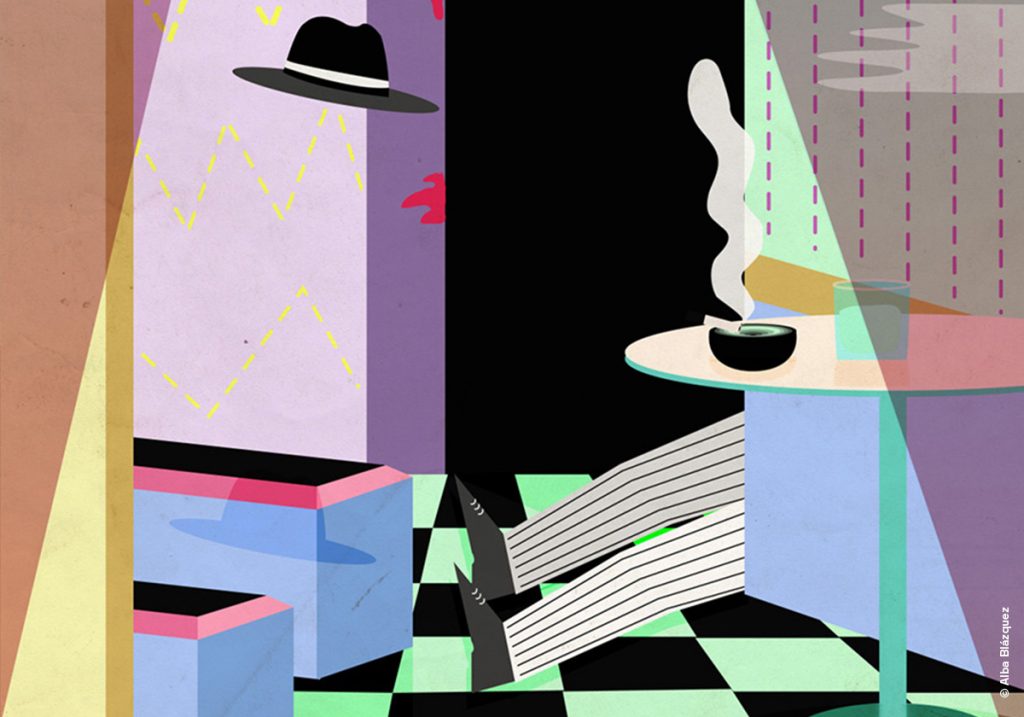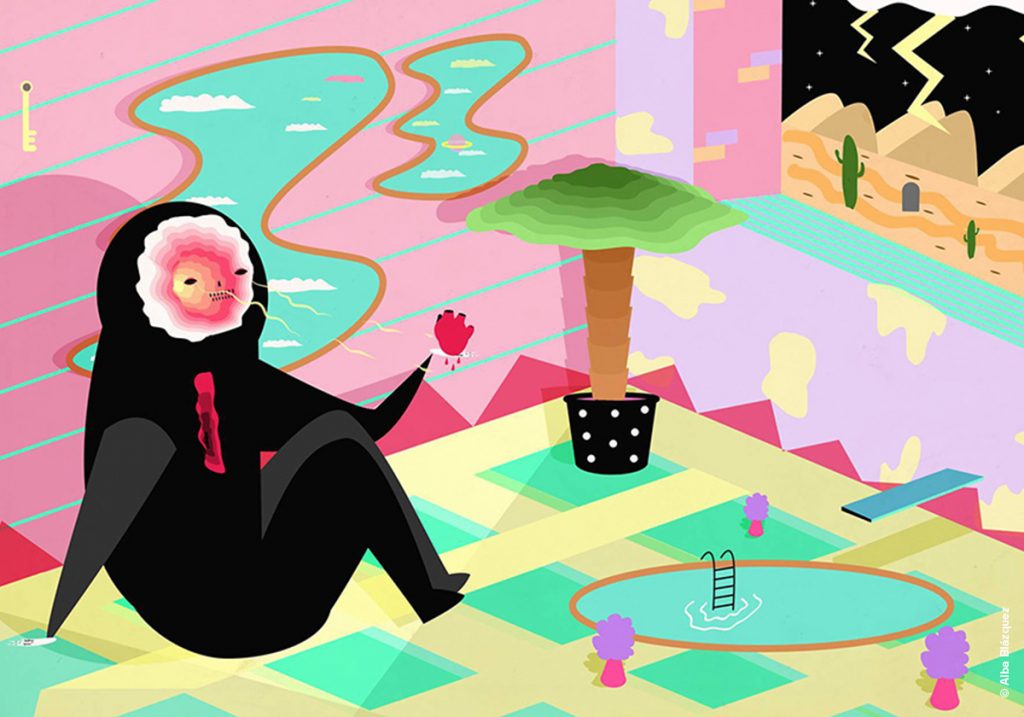Teacher
Professional
- Messages
- 2,669
- Reaction score
- 818
- Points
- 113
We are all eager to give advice, but when it comes down to it, we turn into average hysterics and assholes, make completely unnecessary purchases and are led by scammers. Not everything is so bad: even the ancient kings behaved the same way. We figure out what techniques are developed by neuropsychology to help us do the right thing and be reasonable in defiance of our passionate addicted nature.
King Solomon was the third Jewish king and was considered a model of wisdom among his subjects. People traveled great distances to receive his advice and watch how gracefully the son of David twirls his legendary ring with wise engravings. But when it came to the king himself, wisdom left him. The fact that the ring did not work is evidenced by a series of short-sighted decisions that led to the collapse of the kingdom: hundreds of concubines, boasting of their wealth, neglect of raising a son (who later became a tyrant), squandering of the state treasury.

Why we want to help each other
For the desire to help other people, we owe the development of the neocortex. Species in which it is not developed are deprived of the maternal instinct: for example, reptile cubs after birth are forced to give birth from their relatives, who see only food in their offspring.
We can observe the development of empathy using the example of children. A one-year-old child is already able to feel anxiety when another baby falls next to him: he can immediately stick his thumb in his mouth, as if he hurt himself. Older children begin to become aware of their personality and the fact that they are separate from other people. They try to solve the problem in more cunning ways, for example, offer a soft toy to the injured child. By the age of two, children come to understand that other people's feelings are different from their own. The peak of the development of empathy occurs towards the end of childhood: during this period, children realize that suffering exists beyond the framework of a particular moment. At this age, they can empathize with the situation of a whole group of people, for example, the poor.
Darwin believed that the nature of empathy is selfish motivation.
When you see a suffering person, it brings up memories of your own suffering and you begin to experience intense discomfort (also called emotional resonance). And in order to reduce it, you help another person.
Why is it difficult to give advice to yourself
Imagine a situation: you went to a pool to practice your crawl swimming technique. The horizon is clear, the track is yours alone. You gracefully jump into the water, the old ladies sitting on the sun loungers take turns giving you marks. You have three tens. But then - "BAM", sparks in his eyes. You hit your head against something unknown. You look up and assess the threat: this is a teenager about fourteen years old. If he was also rude to you and splashed water in your face, you will feel righteous anger and direct him to a lightning-fast aggressive solution to the problem.

This activated the amygdala: in response to a stimulus, it gives out an emotional reaction much faster than the prefrontal cortex has time to conduct a "cold" analysis. The amygdala, among other things, is responsible for the formation of aggression, it made your fists clench, and your pulse quickened and set you up to "beat or run."
At a certain level of stress, it is no longer you who take responsibility for your actions, but the archaic center of the brain, which takes over control in the most hopeless circumstances, requiring quick reactions when reflection can cost you your life.
The adrenaline rush gives you an incredible boost of energy. And the media will only tell about it as "a hulk with superhuman strength beat a child in the pool." Being in captivity of emotions, you were not able to give an objective assessment of the case, therefore, not only could you not make the right decision yourself, but also did not remember other people's useful advice.
How to cool down emotions
People who have strong emotions find it difficult to concentrate on their problems. To help yourself, you need to allow the amygdala to “cool”. The less we are personally involved in the situation, the easier it is for us to abstract from emotions and fears and reason rationally.
Scientists Ethan Cross and Igor Grossman conducted several experiments to prove their theory that if we look at the problem in the third person and become our “best friends” who give effective advice, then it is easier for us to accept and solve the problem. In the study, participants became victims of an imaginary betrayal by their partner, and then they had to answer several questions (to see how the subjects could distance themselves from the problem and reason rationally). In the first case, they answered questions in the first person, in the second, the subjects freed themselves from their "ego" and answered in the third person, as if they were giving advice to a friend. The results showed that when participants looked at the situation from the outside, they gave more rational advice.

In the course of this experiment, scientists also proved that in relation to themselves "wisdom does not come over the years": the group of subjects aged 60–80 years was less inclined to reason rationally about their problem.
When a person thinks about himself in a difficult situation, then his "tunnel vision" turns on: the breadth of thinking narrows and thoughts scatter. But if a person presents the same case in relation to another, then he abstracts from the problem and looks at it from the third person, not letting what happened through himself. This distance "turns off" the dramatic effect, muffles the work of the amygdala and allows you to think sanely and wisely.
Other ways to abstract from emotions
In addition to the "third person" technique, there are a number of other ways to help you calm down, look at the state of affairs from different angles and find peace.
Zen Buddhism advises turning on the mode of contradiction and distraction. In this philosophy, the practice of thinking about paradoxes is common, for example: "What does a one-hand clap sound like?" Reflecting on paradoxes can help shift and refresh the mind in an emergency. Contradictions help you develop the ability to deal with uncertainty. You can get acquainted with the European view of Zen Buddhism through the books of Eugen Herrigel "The Art of Archery" or immerse yourself in Vietnamese Buddhism through the small book "As There Is Consciously" by Tit Nat Khan.
Humor allows you to distance yourself, therefore it gives you the necessary emotional release in stressful conditions. Find something funny in yourself or in the whole problem that worries you, draw a caricature of the enemy and write a "pie" about the vicissitudes of your fate. So you can look at everything from a different angle and free yourself from the oppressive role of the victim.
Try on different points of view . Try to view the conflict from the other side's perspective. Write a story on behalf of an employer who did not pay you a fee for four months to feed a mistress, or imagine a conversation between a lover who cheated on you with her therapist.
Breathing and exercise. Exercise helps to cope with anger: it improves concentration and improves mood. Deep breathing reduces emotional arousal.

Why it is difficult for us to follow advice
For the ability to force ourselves to do something, or, conversely, to refrain from something harmful, we owe willpower. Self-control and self-awareness (the ability to track ourselves) are a great couple through which we can predict our actions, analyze the consequences and change our minds beforehand.
Willpower as a product of the work of the prefrontal cortex has arisen not only due to evolution, but also a social factor. One hundred thousand years ago, in order to survive, people had to unite with others. Community implies cooperation and distribution of resources: a person will think many times before taking someone else's mammoth sandwich, because this may be followed by expulsion from the tribe. And wandering alone among huge predators, diseases, and even in an inhospitable environment, most likely, would lead an asocial individual to death.
The more complex our social world became, the more complex our behavior had to become. The need to collaborate and maintain long-term relationships has impacted our brains. We began to develop strategies of self-control, which helps us to restrain our impulses and to be human in the full sense of the word.
Modern man understands that the "tribe" is vital to him: it takes care of him, heals and feeds. Therefore, he would rather take himself into a tight-knit gauntlet, experience the discomfort of overpowering himself and bring some kind of religious philosophy under it - than repeat the fate of an individual without willpower.
Robert Sapolsky, an American neuroendocrinologist and professor of biology, neurology and neurosurgery at Stanford University, believes that the main task of the cerebral cortex of a modern person (a relatively new part of the brain) is to persuade the brain to make more complex decisions ... When you want to smoke, it is the prefrontal cortex that will "give a yellow card" to the brain, reminding you why you quit smoking.
The interaction of different parts of the cortex largely determines whether a person can resist temptation and whether he can resist.
The anterior cingulate cortex helps to cut off contradictions between current actions and global goals (watch another episode or go to bed and get up on time the next morning).
The dorsal part of the frontomedial cortex plays the role of a cop, which interferes with making the wrong decision (for example, sitting down to play computer games instead of writing a diploma).
The sensorimotor cortex must follow orders from the dorsal part. If the executive body does not obey, then we can observe the syndrome of the "anarchist hand": if a person with such a syndrome decides to refuse a donut at the last moment, then an uncontrolled hand will automatically drag it into his mouth.

How the language we speak affects willpower
Keith Chen (American economist of Chinese origin) has suggested that future tense grammatical constructions in a language can influence how far away we see events that have not yet occurred. The scientist thought that in countries where the language has a separate verb form for the future, and in countries where the future and the present in the language are constructed in the same way, time is perceived differently. In Chinese, Estonian, and German, you can speak of the future tense using the same grammatical structures as for the present. For a Chinese, it is quite natural to say something like: "In a year I learned two languages", but for a Russian this syntax sounds unusual. Keith Chen found out that the people of China and Estonia, for example, perceive events that are just about to happen - so,
Having tested his hypothesis, the scientist found that in countries where languages without a pronounced future tense are spoken, they are 31% more likely to save money for old age, 24% less smoke and 29% more likely to keep themselves in good physical shape. Of course, these indicators are also influenced by economic factors and many others, but the theory is entertaining. Learn Chinese.
How to withstand volitional tests
Emotional management is inextricably linked to the training of self-control, which can be trained with specific exercises.
Become aware of the two brain systems . Each test of willpower is a "debate" between two parts of your brain (impulsive "hot" and intelligent "cold") - and two aspects of your personality. How do they behave in a moment of emotional or sensual "temptation"? What does the impulsive side want and what does the wise side want? You can even give them names to make it easier to personify them.
Imagine who you will be if you follow only impulses, and then what your life will be like if you only have mind. Find a balance that you like and think of as a collaboration between two parties.
This will allow you to compare your state at a particular moment with the desired image.

Make strong-willed decisions in advance. Form a volitional decision long before the temptation situation, when it will be difficult for you to focus. For example, pay for a gym membership in advance, pack a bag with a uniform and put it close to the door so that you don't find out in the morning that you are already late.
Track yourself. Check the sequence of your decisions from the most transparent (have you already chosen days for regular jogging?) To veiled (did you take running shoes with you on the appointed days to work, so that you do not have to waste precious time later to go home, or so as not to excuses appeared). This exercise will help you avoid distractions.
Burn the bridges. Make it difficult for you to change your mind. Cortez, in order not to retreat, sank his ships - also you cut off an easy escape route, leave your credit card at home and take only the amount of cash that you can spend on purchases.
Write letters to yourself in the future. To do this, you can use different services. Think about your future self as an existing person: what will it do and how will it evaluate the decisions you are making now? Share with your future self what you are going to do to achieve your long-term goals: when you read the letter in a year, you will be able to assess progress and analyze mistakes.
Look at yourself today through the eyes of the future: what can you regret, and for what actions will the future "I" thank you?
Psychologist Hud Ersner-Hershfield argues that even a brief outline of writing can bring you closer to the future person you want to become.
Listening to emotions is like a kind of intuitive compass. But if you learn to control their outbreaks and leave time for rational processing of the situation, then you can not only give wise advice, but also follow them, which means you can bring yourself closer to your ideal.
knife.media
King Solomon was the third Jewish king and was considered a model of wisdom among his subjects. People traveled great distances to receive his advice and watch how gracefully the son of David twirls his legendary ring with wise engravings. But when it came to the king himself, wisdom left him. The fact that the ring did not work is evidenced by a series of short-sighted decisions that led to the collapse of the kingdom: hundreds of concubines, boasting of their wealth, neglect of raising a son (who later became a tyrant), squandering of the state treasury.

The term "Solomon's paradox" originated in a study by scientists Ethan Cross, professor of psychology at the University of Michigan, and Igor Grossman, Ph.D. from the University of Waterlow. It denotes a situation when a person can give wise and effective advice to other people - but at critical moments he cannot abstract himself, give himself advice and follow it.
Why we want to help each other
For the desire to help other people, we owe the development of the neocortex. Species in which it is not developed are deprived of the maternal instinct: for example, reptile cubs after birth are forced to give birth from their relatives, who see only food in their offspring.
We can observe the development of empathy using the example of children. A one-year-old child is already able to feel anxiety when another baby falls next to him: he can immediately stick his thumb in his mouth, as if he hurt himself. Older children begin to become aware of their personality and the fact that they are separate from other people. They try to solve the problem in more cunning ways, for example, offer a soft toy to the injured child. By the age of two, children come to understand that other people's feelings are different from their own. The peak of the development of empathy occurs towards the end of childhood: during this period, children realize that suffering exists beyond the framework of a particular moment. At this age, they can empathize with the situation of a whole group of people, for example, the poor.
Darwin believed that the nature of empathy is selfish motivation.
When you see a suffering person, it brings up memories of your own suffering and you begin to experience intense discomfort (also called emotional resonance). And in order to reduce it, you help another person.
Why is it difficult to give advice to yourself
Imagine a situation: you went to a pool to practice your crawl swimming technique. The horizon is clear, the track is yours alone. You gracefully jump into the water, the old ladies sitting on the sun loungers take turns giving you marks. You have three tens. But then - "BAM", sparks in his eyes. You hit your head against something unknown. You look up and assess the threat: this is a teenager about fourteen years old. If he was also rude to you and splashed water in your face, you will feel righteous anger and direct him to a lightning-fast aggressive solution to the problem.

This activated the amygdala: in response to a stimulus, it gives out an emotional reaction much faster than the prefrontal cortex has time to conduct a "cold" analysis. The amygdala, among other things, is responsible for the formation of aggression, it made your fists clench, and your pulse quickened and set you up to "beat or run."
At a certain level of stress, it is no longer you who take responsibility for your actions, but the archaic center of the brain, which takes over control in the most hopeless circumstances, requiring quick reactions when reflection can cost you your life.
The adrenaline rush gives you an incredible boost of energy. And the media will only tell about it as "a hulk with superhuman strength beat a child in the pool." Being in captivity of emotions, you were not able to give an objective assessment of the case, therefore, not only could you not make the right decision yourself, but also did not remember other people's useful advice.
How to cool down emotions
People who have strong emotions find it difficult to concentrate on their problems. To help yourself, you need to allow the amygdala to “cool”. The less we are personally involved in the situation, the easier it is for us to abstract from emotions and fears and reason rationally.
Scientists Ethan Cross and Igor Grossman conducted several experiments to prove their theory that if we look at the problem in the third person and become our “best friends” who give effective advice, then it is easier for us to accept and solve the problem. In the study, participants became victims of an imaginary betrayal by their partner, and then they had to answer several questions (to see how the subjects could distance themselves from the problem and reason rationally). In the first case, they answered questions in the first person, in the second, the subjects freed themselves from their "ego" and answered in the third person, as if they were giving advice to a friend. The results showed that when participants looked at the situation from the outside, they gave more rational advice.

In the course of this experiment, scientists also proved that in relation to themselves "wisdom does not come over the years": the group of subjects aged 60–80 years was less inclined to reason rationally about their problem.
When a person thinks about himself in a difficult situation, then his "tunnel vision" turns on: the breadth of thinking narrows and thoughts scatter. But if a person presents the same case in relation to another, then he abstracts from the problem and looks at it from the third person, not letting what happened through himself. This distance "turns off" the dramatic effect, muffles the work of the amygdala and allows you to think sanely and wisely.
Other ways to abstract from emotions
In addition to the "third person" technique, there are a number of other ways to help you calm down, look at the state of affairs from different angles and find peace.
Zen Buddhism advises turning on the mode of contradiction and distraction. In this philosophy, the practice of thinking about paradoxes is common, for example: "What does a one-hand clap sound like?" Reflecting on paradoxes can help shift and refresh the mind in an emergency. Contradictions help you develop the ability to deal with uncertainty. You can get acquainted with the European view of Zen Buddhism through the books of Eugen Herrigel "The Art of Archery" or immerse yourself in Vietnamese Buddhism through the small book "As There Is Consciously" by Tit Nat Khan.
Humor allows you to distance yourself, therefore it gives you the necessary emotional release in stressful conditions. Find something funny in yourself or in the whole problem that worries you, draw a caricature of the enemy and write a "pie" about the vicissitudes of your fate. So you can look at everything from a different angle and free yourself from the oppressive role of the victim.
Try on different points of view . Try to view the conflict from the other side's perspective. Write a story on behalf of an employer who did not pay you a fee for four months to feed a mistress, or imagine a conversation between a lover who cheated on you with her therapist.
Breathing and exercise. Exercise helps to cope with anger: it improves concentration and improves mood. Deep breathing reduces emotional arousal.

Why it is difficult for us to follow advice
For the ability to force ourselves to do something, or, conversely, to refrain from something harmful, we owe willpower. Self-control and self-awareness (the ability to track ourselves) are a great couple through which we can predict our actions, analyze the consequences and change our minds beforehand.
Willpower as a product of the work of the prefrontal cortex has arisen not only due to evolution, but also a social factor. One hundred thousand years ago, in order to survive, people had to unite with others. Community implies cooperation and distribution of resources: a person will think many times before taking someone else's mammoth sandwich, because this may be followed by expulsion from the tribe. And wandering alone among huge predators, diseases, and even in an inhospitable environment, most likely, would lead an asocial individual to death.
The more complex our social world became, the more complex our behavior had to become. The need to collaborate and maintain long-term relationships has impacted our brains. We began to develop strategies of self-control, which helps us to restrain our impulses and to be human in the full sense of the word.
Modern man understands that the "tribe" is vital to him: it takes care of him, heals and feeds. Therefore, he would rather take himself into a tight-knit gauntlet, experience the discomfort of overpowering himself and bring some kind of religious philosophy under it - than repeat the fate of an individual without willpower.
Robert Sapolsky, an American neuroendocrinologist and professor of biology, neurology and neurosurgery at Stanford University, believes that the main task of the cerebral cortex of a modern person (a relatively new part of the brain) is to persuade the brain to make more complex decisions ... When you want to smoke, it is the prefrontal cortex that will "give a yellow card" to the brain, reminding you why you quit smoking.
The interaction of different parts of the cortex largely determines whether a person can resist temptation and whether he can resist.
The anterior cingulate cortex helps to cut off contradictions between current actions and global goals (watch another episode or go to bed and get up on time the next morning).
The dorsal part of the frontomedial cortex plays the role of a cop, which interferes with making the wrong decision (for example, sitting down to play computer games instead of writing a diploma).
The sensorimotor cortex must follow orders from the dorsal part. If the executive body does not obey, then we can observe the syndrome of the "anarchist hand": if a person with such a syndrome decides to refuse a donut at the last moment, then an uncontrolled hand will automatically drag it into his mouth.

How the language we speak affects willpower
Keith Chen (American economist of Chinese origin) has suggested that future tense grammatical constructions in a language can influence how far away we see events that have not yet occurred. The scientist thought that in countries where the language has a separate verb form for the future, and in countries where the future and the present in the language are constructed in the same way, time is perceived differently. In Chinese, Estonian, and German, you can speak of the future tense using the same grammatical structures as for the present. For a Chinese, it is quite natural to say something like: "In a year I learned two languages", but for a Russian this syntax sounds unusual. Keith Chen found out that the people of China and Estonia, for example, perceive events that are just about to happen - so,
Having tested his hypothesis, the scientist found that in countries where languages without a pronounced future tense are spoken, they are 31% more likely to save money for old age, 24% less smoke and 29% more likely to keep themselves in good physical shape. Of course, these indicators are also influenced by economic factors and many others, but the theory is entertaining. Learn Chinese.
How to withstand volitional tests
Emotional management is inextricably linked to the training of self-control, which can be trained with specific exercises.
Become aware of the two brain systems . Each test of willpower is a "debate" between two parts of your brain (impulsive "hot" and intelligent "cold") - and two aspects of your personality. How do they behave in a moment of emotional or sensual "temptation"? What does the impulsive side want and what does the wise side want? You can even give them names to make it easier to personify them.
Imagine who you will be if you follow only impulses, and then what your life will be like if you only have mind. Find a balance that you like and think of as a collaboration between two parties.
This will allow you to compare your state at a particular moment with the desired image.

Make strong-willed decisions in advance. Form a volitional decision long before the temptation situation, when it will be difficult for you to focus. For example, pay for a gym membership in advance, pack a bag with a uniform and put it close to the door so that you don't find out in the morning that you are already late.
Track yourself. Check the sequence of your decisions from the most transparent (have you already chosen days for regular jogging?) To veiled (did you take running shoes with you on the appointed days to work, so that you do not have to waste precious time later to go home, or so as not to excuses appeared). This exercise will help you avoid distractions.
Burn the bridges. Make it difficult for you to change your mind. Cortez, in order not to retreat, sank his ships - also you cut off an easy escape route, leave your credit card at home and take only the amount of cash that you can spend on purchases.
Write letters to yourself in the future. To do this, you can use different services. Think about your future self as an existing person: what will it do and how will it evaluate the decisions you are making now? Share with your future self what you are going to do to achieve your long-term goals: when you read the letter in a year, you will be able to assess progress and analyze mistakes.
Look at yourself today through the eyes of the future: what can you regret, and for what actions will the future "I" thank you?
Psychologist Hud Ersner-Hershfield argues that even a brief outline of writing can bring you closer to the future person you want to become.
Listening to emotions is like a kind of intuitive compass. But if you learn to control their outbreaks and leave time for rational processing of the situation, then you can not only give wise advice, but also follow them, which means you can bring yourself closer to your ideal.
knife.media

